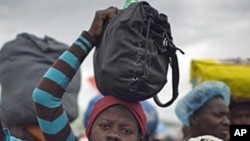Haitian officials are urging residents to seek shelter as a tropical storm bearing heavy rain approaches the Caribbean nation. The storm poses a special risk to residents who have been living in tent communities since the January earthquake.
Haiti's government reached out to hundreds of thousands of people living in tents since the January earthquake, and asked them to flee to hardened structures. Speaking on national radio, President Rene Preval told people to evacuate if necessary to protect their lives.
Weather forecasters said Tropical Storm Tomas was downgraded from a hurricane, but it still posed a danger when it reaches Haiti on Friday. Experts at the National Hurricane Center in Miami say low-lying parts of Haiti could see a storm surge of up to one meter, and as much as 25 centimeters of rainfall.
On Thursday, aid workers were moving scores of residents in the Corail camp, in a mountainous area outside of Port-au-Prince. Relief groups and Haiti's government helped to move thousands of people to the area following the January earthquake which destroyed homes and buildings in and around the capital.
Now, officials fear the tent camp is too exposed to high winds and flooding from Tropical Storm Tomas.
Leondard Doyle is a spokesman with the International Organization for Migration, which was working to relocate women and children living in Corail.
"They're in tents on the side of a mountain, which is particularly vulnerable because it is wind-swept and the tents could be blown away, so that is why we are moving women and children," he said. "They are being taken to a disused hospital nearby, which has been disused since the Duvalier period. And they are going to be kept in shelther there for 24 to 48 hours."
Aid workers and officials say some camp residents were resisting evacuation efforts, out of concern they were being forced to relocate to another area.
Health officials said the hurricane could worsen conditions in many of the tent communities near Port-au-Prince. The Artibonite region north of the capital has been struggling with a cholera epidemic, which has killed more than 300 people in recent weeks.
U.S. weather forecasters said warnings also were in effect for eastern Cuba, Jamaica, the Turks and Caicos islands and parts of the Bahamas.
Haiti Braces for Tropical Storm Tomas




